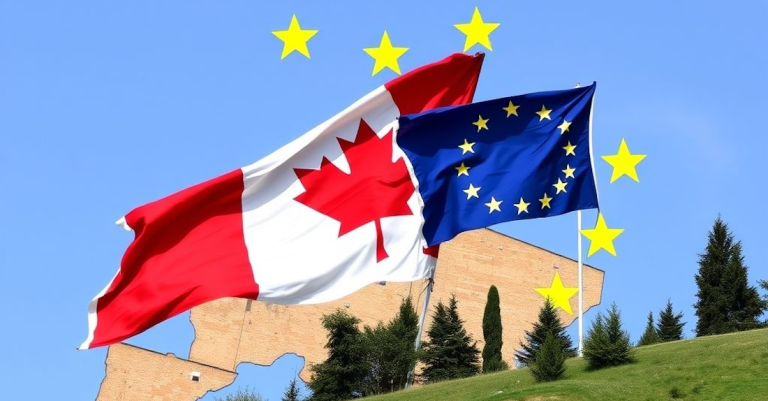
60% of respondents hold negative views of the U.S., compared to 68% favoring the EU
Toronto – A surprising shift in Canadian public opinion has ignited transatlantic debates about North America’s geopolitical future. Nearly half of Canadians now express openness to exploring membership in the European Union, according to a February 2025 poll by Abacus Data, reflecting growing disillusionment with U.S. relations under the Trump administration.
While experts dismiss immediate prospects, the idea has gained traction among policymakers and citizens alike, reshaping conversations about Canada’s global alliances.

Poll Reveals Divided Sentiment Amid U.S. Trade Tensions
The survey of 1,500 Canadians found 46% support joining the EU, with 34% opposed and 25% undecided.
Younger voters (18–29) showed the strongest enthusiasm, while older demographics expressed skepticism.
This divide mirrors broader frustrations: 60% of respondents hold negative views of the U.S., compared to 68% favoring the EU.
The trend coincides with renewed U.S. tariff threats and Donald Trump’s rhetoric about annexing Canada as a “51st state.”
Prime Minister Mark Carney called these comments “unproductive” during his inaugural European diplomatic tour.
German Lawmaker Champions “Political Erasmus” Strategy
Joachim Streit, a German MEP from the liberal Renew group, has spearheaded efforts to deepen Canada-EU ties. Citing shared values and Canada’s “European DNA” from French and British colonial roots, he proposed a “political Erasmus” program to facilitate policy exchanges between officials.
Streit argues that Canada’s Arctic border with Greenland—a Danish territory—and existing partnerships like the Comprehensive Economic and Trade Agreement (CETA) blur geographic barriers18. However, the European Commission reiterated that Article 49 of the EU Treaty restricts membership to European states, calling the poll “flattering but legally impractical.”
Legal Hurdles vs. Strategic Ambitions
Despite enthusiasm, Canada’s path to membership faces stark challenges. The EU has never admitted a non-European country, though Cyprus—geographically in West Asia—sets a contested precedent.

Streit suggests amending Article 49, but officials like Commission spokesperson Paula Pinho emphasize prioritizing current candidates like Ukraine and Montenegro49. Meanwhile, 62% of Canadians believe EU membership would boost trade, while 50% predict worsened U.S. relations.
Québec’s cultural affinity for France—71% of Québécois see France as a key EU partner—adds complexity to national unity debates.
From Curiosity to Policy Discourse
What began as a fringe discussion in 2005 has evolved into a strategic dialogue. The Canada-EU Green Alliance (2023) and Horizon Europe scientific collaboration signal deepening integration.
Former Belgian Prime Minister Guy Verhofstadt and German ex-Foreign Minister Sigmar Gabriel have endorsed the idea, framing it as a counterweight to U.S. volatility.
Yet critics like political scientist Michael Hart dismiss it as “constitutional fantasy,” noting Canada’s reliance on NATO and existing CETA benefits. As Liberal Party voters lean pro-EU and Conservatives resist, the issue risks polarizing Canada’s 2025 election cycle.